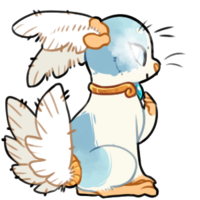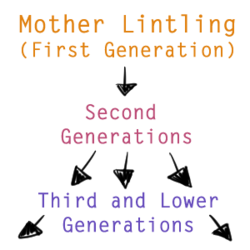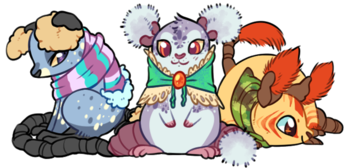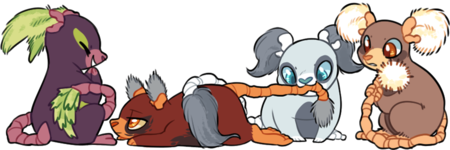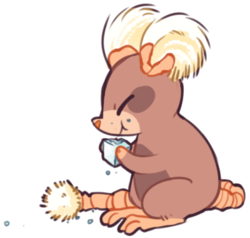Difference between revisions of "Lintling"
(→Communication) |
(→Communication) |
||
| Line 73: | Line 73: | ||
=== Communication === | === Communication === | ||
| − | Lintlings communicate heavily through body | + | Lintlings communicate heavily through body language, as a means to stay extra quiet while out scouting the areas for more food or materials. Lintlings are always careful to try and not alert pillowings or other living things of their presence. Lintlings are not able to produce human speech. But much like ordinary mice and rats they make the following noises. |
* Squeaks | * Squeaks | ||
* Squeals | * Squeals | ||
Revision as of 11:08, 10 October 2014
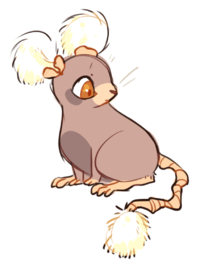 | |
| ( A Closed Species ) | |
|---|---|
|
DA Group: Clo-Critters Terms of Use | |
Created by the same artisan who invented the Pillowings. They were created with the same intent as pillowings to be a smaller version of a comfort creature. A travel sized buddy if you will. However the same magic heart token used to create pillowings proved to be too powerful for the small lintling body to easily be controlled. The first created lintling became full of life and even self aware. It seemed to crave more and more activities that didn't benefit it's owner. When it realized it's needs were not going to be met, the lintling escaped.
No one except for the artisan knew where all the lintlings came from, or even what they were at first. Some how the first lintling that escaped found a way to procreate more and more of it's kind. The lintlings created from the first followed their lead by creating more of their own. They quickly become the residents of Clo's newest pest! Spreading out and moving into comfortable homes in swarms to thrive and create even more lintlings. No one really knows how to stop them, but as an aid to help keep them under control Pillowings have been given the drive to hunt and chase out lintlings from their house holds.
Contents
Physical Characteristics
Lintlings can vary greatly in a variety of characteristics (A visual guide will be added in later like the pillowings Feature Guide!). Their sizes can range from a small mouse to a extremely large rat. The most common size of a lintling 6"-8" the smaller sizes gives them more room to crawl into furniture, walls, and tiny crawl spaces. Larger lintlings have a harder time getting around which makes their survival rate lower. Lintling Mother has the finest crafted lintling, thanks to her life giving magic you can no longer even see the seams that had been used to bring her together. Her fabric now turned into a fine shimmering fur. It is clear the very heart of the artisan who created her gave a special piece of their self into this small creature. In return Lintling Mother does the same with her pups, giving them not only magic but the inspiration to continue to grow and create more vibrant designs.
Second Generations of lintlings are empowered with their mothers creativity and seek to replicate it as she did for them. Making more and more wonderful lintlings to make their mother proud of them and their dedication. They do not have the finesse as their Mother, but they make due with what they have on paw. Thanks to the efforts of second generation lintlings, they even make third generation lintlings a marvel to look at. As the ling continues down to generation three and lower the lintlings do not have that special touch of inspiration that has been passed down from the creator and Lintling Mother. Which leads to more poorly crafted lintlings, most simple mouse like creations. Their uniqueness happens purely on chance based on what their creator happened to find for materials.
First Generation
First Generation refers to the lintlings that were crafted and enchanted by artisans that have a heart token in their chest giving them self sustaining energy and the ability to repair themselves and other lintlings. The heart tokens magic is too great for such a small body which is why it drives the lintling to create more and more of it's kind. A safe way to dispense all of the excess magic it holds inside of itself.
So far we only know of one hand crafted lintling. This lintling is referred to as the Mother Lintling. Her image is shown to the left of us, her specially detailed wing like fluffs are specially made by humanoid hands. Same reason she wears a gold collar around her neck as human decoration.
Second Generation
Second generation lintlings are lintlings that were personally made by the Lintling Mother herself. These lintlings have a much higher magic store than other lower class lintlings. They are often made with special features like Lintling Mother, special ears, tails, and even clothing/accessories! Second gen lintlings often retain some of that special creative magic that the Mother bestowed upon them giving them the abilities to create and craft like her. A driving need to make better and better things and lintlings. Because Lintling Mother can not watch over all of her pups, she relies on the aid of her second gen pups to be leaders and watch over the rest of the lintlings when she isn't there to help.
Third and Later Generations
Third and lower generations of lintlings are the more average of the bunch when it comes to lintlings. They are the most common lintling you will ever see around your home. Their main job is to survive and collect goods to create more lintlings. If they do not have Lintling Mother there with them or a second gen leader they will create lintlings themselves with their own resources and magic. These lintlings are more mouse and rat like, a little more average and plain.
Lower generation lintlings have to be cautious though when spending their magic to help create more lintlings. Because they don't have the endless supply of magic like Lintling Mother or a large store of it like their second gen lintlings they easily could run out of the very magic that keeps them active and alive, without it they will wither and die. This is very common in lintling colonies that do not have a second gen lintling leader or aid.
Habitat
Lintlings tend to live where ever there is intelligent life. contact. They aren't necessarily looking to make contact with humans or humanoid like figures, but they love the comfort and warmth of their well built homes. Lintlings do not survive well outside in the wild where weather conditions and predators can easily harm them. So instead they stick to mostly indoor enclosures.
Generally seeking out safety in whatever manmade structures they can find, lintlings are known to make their homes in warm comfortable houses where there are a variety of supplies available to help create large nests, and more importantly, and further generations of lintlings to add to their colonies. The small creatures must meet these needs by finding homes with excess clutter and usually soft carpeting that traps lint. A home of mostly hard surfaces with very little in it, will deter lintlings from colonizing.
These creatures can be quite destructive for their size. Ordinarily, a lintling will only look for loose or fallen supplies: buttons under the couches, lint in the carpets, tooth picks on the floor of the kitchens, etc. Any little discarded things they will take without anyone knowing any better. However if there is a lack of discarded materials easily available, the lintlings can become desperate for more supplies. Stressed lintlings have even been known to chew and wreck the furniture and goods inside of their adopted home. Taking large chunks of drapes, blankets, rugs, anything at all they can chew through and take home with them.
Lintlings normally nest in the walls, but occasionally will make a comfortable next in the attic or basements. In warmer climates, colonies have been found in garages and barns as well. Particularly rare, but known to happen, some lintlings will make nests in plain sight, often hollowing out something like an old recliner chair or couch to live inside. Since most tend to view lintlings as a pest, these types of nests are very rare except in abandoned homes.
Diet
Much like Pillowings it's assumed that lintlings do not possess internal organs. No one has really caught one to examine or dissect to be sure. They appear to have functioning mouths such as tongues, teeth, and swallowing capabilities regardless.
From careful watching, it has been said that injured lintlings will eat bits of string or other materials that will patch them from the inside out. Usually the stronger the magic they have, the better they heal. But because lower generation of lintlings do not have an ever lasting supply of life magic, they look to find new ways to sustain themselves. The Lintling Mother can't be everywhere for all lintlings. A new and interesting thing discovered about lintlings is that they appear to actually eat. Regardless of not having any internal organs, they seem to love collecting crumbs and various other edible goods to devour. Strangely enough they don't seem to produce any waste from the act of eating? Instead the entire substance is transformed into energy and replenishes them.
One of the lintling's favorite treats is sugar. It's known you can lure out lintlings with sugar cubes!
Behavior and Interaction
Lintlings are extremely social. They tend to build off of one another and start from small family groups until they build larger colonies. Lintlings are extremely skittish and timid creatures. They do well to interact with each other and enjoy play, but with other creatures they are easily spooked back into their holes and nests.
Lintlings all like to huddle together when it comes time to rest, a natural way to rub each others scent on the family to make sure they all know they belong together. Careful patching and grooming happens often to help build trust and keep firm bonds with each other. Lintlings are actually proven to be very intelligent and the more creative lintlings will even craft goods to help make their chores and tasks easier. It's been seen that lintlings understand how to make ropes and ladders to climb down high surfaces. They even will craft goods for each other like clothing or accessories as gifts to show their bonds. Lintlings even love to craft goods for themselves to make them more comfortable.
Colonies
They tend to live in large groups referred to as colonies. Usually this starts with just one to a hand full of lintlings to create a large colony for just one house hold. If the Lintling Mother or any second generation lintlings are present, the colony will grow fast and large with the extra supply of life giving magic. If it is just lower generation lintlings they will take a lot more time to develop a large enough group or colony because it strains and depletes their life force. If a lintling is not careful and gives up too much of it's life sustaining magic to procreate more lintlings it will eventually grow weary and wither away.
Lintlings will often live in a social hierarchy much like dogs. No lintling would dare challenge Lintling Mother, she is considered a deity among lintlings and is to be respected and protected at all costs. Second generation lintlings are usually natural born leaders and creators. If there is more than one 2nd gen they will have to fight and bicker as to who tops who. If it's only one 2nd gen in a group of lower gens the 2nd will almost always come to lead them and do their best to look after the colony. If a 2nd gen is not present at all the lower gens will just fight among themselves until a new social hierarchy has been set in stone.
Communication
Lintlings communicate heavily through body language, as a means to stay extra quiet while out scouting the areas for more food or materials. Lintlings are always careful to try and not alert pillowings or other living things of their presence. Lintlings are not able to produce human speech. But much like ordinary mice and rats they make the following noises.
- Squeaks
- Squeals
- Yelps
- Whimpers
- Clicking or Chirping
- Growls or Hissing
